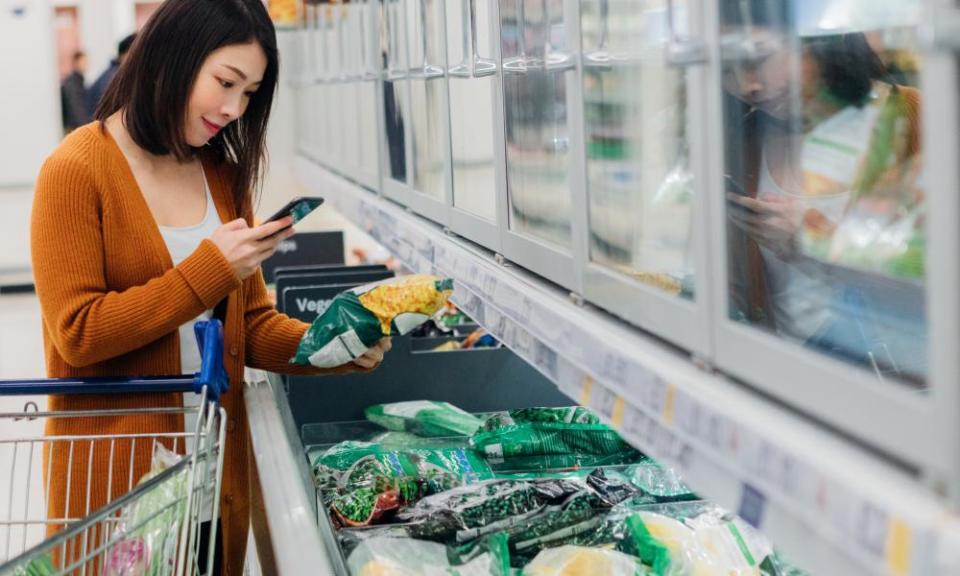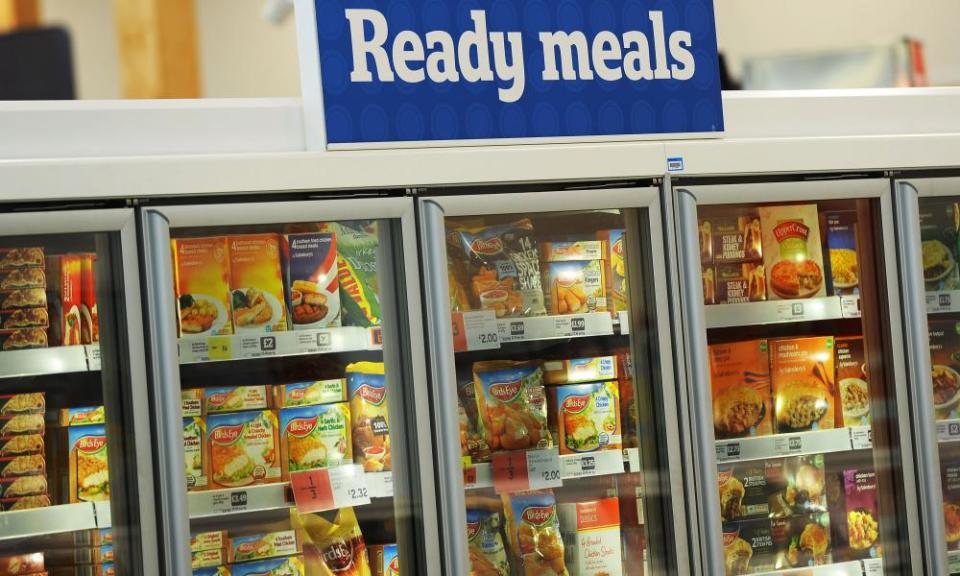UK food bills: can you really save money if you buy frozen?

With runaway food price inflation now adding more than £800 to the average household’s annual grocery bill, Britons are being forced to change the way they shop, whether it’s by switching supermarkets or by ditching their favourite brands in favour of cheaper own-label options.
Figures suggest savvy shoppers are also increasingly making a beeline for the freezer aisle, not only to save on staples but also for treats such as upmarket ready meals and desserts.
But does this really cut your food bill and, if so, by how much? What are the best (and worst) things to buy? Here, we lift the (freezer) lid on the savings some experts say people can make, and offer up some top tips from freezer fans.
Sales are up
With the latest official numbers showing food and drink prices racing up 19% in the past 12 months, it is perhaps no surprise that the freezer section – with its reputation for low prices – is back in vogue.
Because of the cost of living crisis, shoppers are buying less food overall.
However, despite this, in the 12 weeks to 16 April, frozen food sales volumes rose by 0.5%, according to the supermarket analysts Kantar, while sales of fresh food fell back 3.3%.
Frozen food is the “greatest story never told to the British public”, according to Andrew Staniland, the group buying director at Iceland Foods.
Since the crisis took hold last year, shoppers have been heading to Iceland stores, which, he says, offer about a 30% saving in comparison with fresh.
Initially, he says, customers were cautiously swapping fresh chicken, fish and vegetables for frozen but then graduated to prepared foods such as ready meals and desserts as they became more comfortable with the switch.
“Consumers are starting to realise the frozen food offer is now as broad as the fresh offer,” he says. “We’ve seen the same level of inflation but frozen has maintained its price gap, so is the cheaper of the two options.”
Traditionally, frozen food sales pick up during tough economic times, with the focus on saving money and avoiding food waste.
The sector also boomed during the pandemic, with sales rocketing 30% as people were stuck at home and facing restrictions.
What are people buying?
At the moment, demand is strongest for items such as frozen chicken, up almost 10%, Kantar says, with prepared foods, including ready meals, pizzas and chips, up 3.7%.
“Frozen food supermarkets have developed their ranges a lot since the last cost of living crisis,” Staniland says, with chains offering “luxury” frozen ranges. “Most of the market is now benchmarking Waitrose and Marks & Spencer on products such as ready meals.”

Photograph: Jack Sullivan/Alamy
Crunching the numbers
So are the savings really as big as Staniland says?
The 30% figure relates back to a 2019 study by Manchester Metropolitan University. Its findings suggested that 18 out of 20 families found frozen to be better value, with an average saving of 29.9%.
In a more recent study, the consumer group Which? looked at comparable own-label fresh and frozen products in nine supermarkets. (All prices are 100g and from February 2023.)
Those prepared to opt for frozen foods in the supermarket will probably find some great-value alternatives to fresh
Ele Clark of Which?
For breaded cod, for example, the cheapest fresh was 75p, while frozen was 72p. Fresh raspberries started at £1.26 but only 43p in the freezer. The cheapest fresh “meat feast” pizza was 60p but 26p frozen. Broccoli started at 19p fresh, 11p frozen.
Some frozen items, including pastries and ready meals, cost more but Which? concluded that for most things, frozen “could save money”.
The Which? retail editor, Ele Clark, says: “No one wants to overpay for basic groceries.
“Those prepared to opt for frozen foods in the supermarket will probably find some great-value alternatives to fresh.
“Fresh is often viewed as the best quality choice but this isn’t necessarily the case, and frozen food obviously lasts a lot longer, which could help you reduce food waste as well.”
Is it better for the planet?
If food waste is a problem in your household – the average family with children throws away food worth £60 a month – buying frozen could help eliminate this.
Waste is bad for your pocket and the planet because about a third of the UK’s greenhouse gas emissions are associated with food and drink.
“If you’re wasting the food you buy, you’re wasting money,” says Helen White, the environmental charity Wrap’s special adviser for household food waste.
“Frozen food lasts longer, you can use the amount you need when you need it and, in some cases, it’s cheaper.”
With fresh vegetables and salad among the most wasted foods in the UK, White says swapping fresh for frozen might be a good option.
“We’re not just talking peas, carrots, cauliflower and broccoli,” she adds. “You can now get frozen mushrooms, peppers, Mediterranean-style roasted vegetables, butternut squash and spinach, not to mention chopped onions.”
If you end up throwing away bananas and berries bought for smoothies, she suggests swapping them for a frozen fruit mix.
“Freezing acts like a pause button. Food in a freezer won’t deteriorate, and most bacteria can’t grow in it.”
Why is it cheaper?
In short, because it can be transported over longer distances, and there is less waste in the supply chain.
“The fresh supply chain cannot handle the distances you ship frozen food,” Staniland says.
“You also can introduce longer, and more efficient, manufacturing runs than on fresh. It’s nothing to do with the ingredients.”
Why, then, is it still overlooked by some shoppers? Staniland suggests this is a hangover from the 1980s and 1990s, when frozen was associated with convenience food such as chicken nuggets and chips: “Since then, the whole category has evolved.”

 Yahoo Finance
Yahoo Finance 